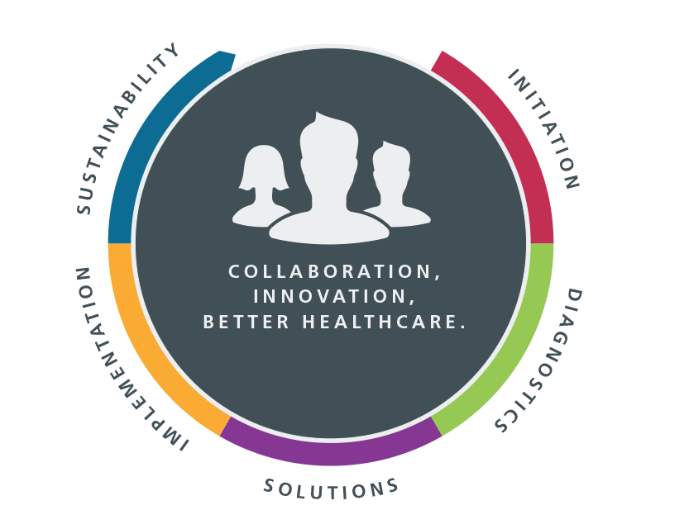The positive impact of redesign training across NSW Health has been captured in three research papers. Results found that a blended model of learning provides meaningful, deep learning to develop and implement new ways to deliver care.
When the ACI first offered the Graduate Certificate (Clinical Redesign) in 2016, three team members from the Central Coast Local Health District redesigned pharmacy procurement and saved more than $2.47 million over four years. Since then, other districts have followed suit, ensuring precious savings are injected back into the delivery of care.
As one graduate describes the program, “[Redesign] breathes life into the project. In a sense, it widens the lens of the initial project idea and allows for more ideas, communication and innovation to be revealed".
Since 2016, almost 280 people have graduated from the ACI’s Graduate Certificate (Clinical Redesign) course. Prior to this, more than 400 students had already conducted redesign projects through the Centre for Healthcare Redesign and been awarded a Diploma. Many of these students have now converted their Diplomas into Graduate Certificates.
“The change to a Graduate Certificate recognises the significant learning students achieve, and creates a pathway to a higher degree,” explains Lea Kirkwood, Director of ACI’s STEP directorate, at last year’s graduation ceremony in December.

The ACI has partnered with the University of Tasmania to offer three Graduate Certificate programs each year for managers, clinicians and other frontline staff working in the NSW health system.
Participating teams are supported with comprehensive training and workplace mentoring in the use of contemporary project, improvement and change skills. They are required to lead a real project in their workplace which includes talking with patients and staff to understand the consumer experience.
As one 2016 graduate pointed out, “innovation is encouraged and somewhat ensured,” because project developers engage with stakeholders and consumers.
“The program focused my thinking on the importance of continuous improvement and seeking opportunities within the healthcare sector for innovation and change.” That student went on to complete a Masters in Business Administration (MBA) in Innovation and Leadership and accept new leadership roles within, and outside, their profession.
“The redesign program is intensive and challenging,” adds Ms Kirkwood. “While participants are learning, they are applying the skills to a real-world issue, providing them with the knowledge and skills they need to improve health service delivery, now and into the future.”
[Redesign] breathes life into the project. In a sense, it widens the lens of the initial project idea and allows for more ideas
The impact of redesign

In 2017, the ACI and the University of Tasmania commenced a large-scale program evaluation to understand the impact of redesign across NSW Health. As a result, three papers have been published; the most recent in February 2021.
- Learning in Practice: Collaboration is the Way to Improve Health System Outcomes examined the course outcomes after two years of operation via an online survey. Students expressed high levels of satisfaction with the course and reported an increase in knowledge of redesign methods and the ability to translate this into practice.1
- Organizational Support in Healthcare Redesign Education: a Mixed-Methods Exploratory Study of Expert Coach and Executive Sponsor Experiences used an online survey and interviews to ask key facilitators of workplace-based projects about their experiences.
While it was generally agreed that the course had made valuable contributions to organisations, the study highlighted the importance of workplace champions and adequate resourcing and time for redesign projects. This information was highly valuable in informing the program moving forward. 2
- The Healthcare Redesign Student Experience: Qualitative and Quantitative Insights of Postgraduate Work-integrated Learning reported that social interaction, communication, knowledge and skills development were highly valued by students. Also important were support, feedback, clear expectations and coaches (redesign leaders) in the successful delivery of enabling health improvement through postgraduate studies.3
In 2018, the Graduate Certificate (Clinical Redesign) program was named winner of Bond University’s National Education Award for Sustainable Healthcare. The award recognises pioneers who have developed educational offerings that promote best practice in high value healthcare.
Learn more about the Graduate Certificate (Clinical Redesign).
Learn more about the ACI’s Centre for Healthcare Redesign and visit the Innovation Exchange where past graduates have shared their projects.
- Van Dam PJ, Griffin P, Reeves NS, et al. learning in practice: collaboration is the way to improve health system outcomes. Healthcare. 2019;7(3):90. doi: /10.3390/healthcare7030090.
- Van Dam PJ, Griffin P, Peterson PG, et al. Organizational support in healthcare redesign education: a mixed-methods exploratory study of expert coach and executive sponsor experiences. Int J Environ Res Public Health. 2020;17(15): 5308 doi: 10.3390/ijerph17155308.
- Prior SJ, Van Dam PJ, Griffin P, et al. The healthcare redesign student experience: qualitative and quantitative insights of postgraduate work-integrated learning. Higher Education Research and Development. 2021. doi: 10.1080/07294360.2020.1867515.